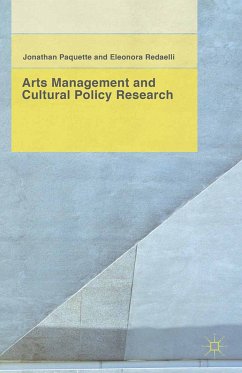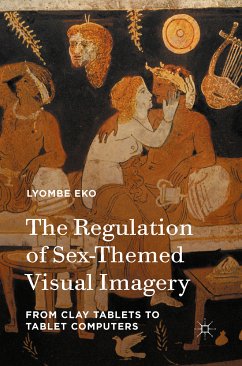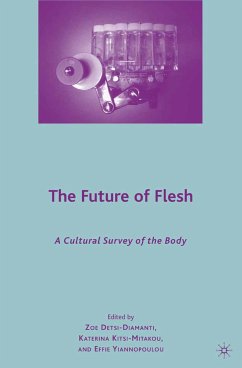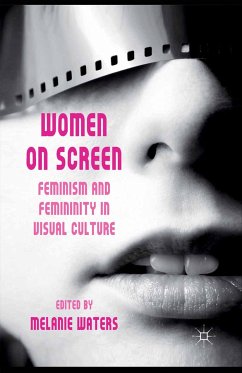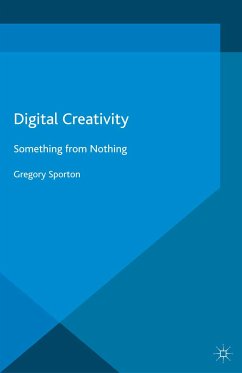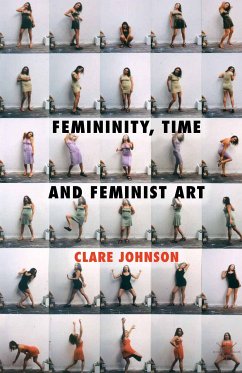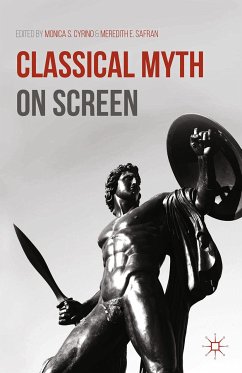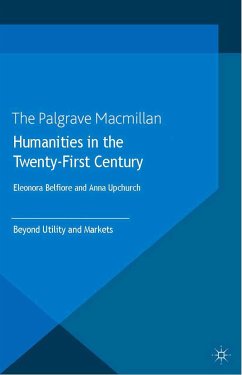
Humanities in the Twenty-First Century (eBook, PDF)
Beyond Utility and Markets

PAYBACK Punkte
20 °P sammeln!






This collection of essays by scholars with expertise in a range of fields, cultural professionals and policy makers explores different ways in which the arts and humanities contribute to dealing with the challenges of contemporary society in ways that do not rely on simplistic and questionable notions of socio-economic impact as a proxy for value.
Dieser Download kann aus rechtlichen Gründen nur mit Rechnungsadresse in A, B, BG, CY, CZ, D, DK, EW, E, FIN, F, GR, HR, H, IRL, I, LT, L, LR, M, NL, PL, P, R, S, SLO, SK ausgeliefert werden.
Michael Bérubé, Pennsylvania State University, USA Connie Johnston, Massachusetts, USA Howard I. Kushner, USA Leslie S. Leighton, Emory University, USA David Looseley, University of Leeds, UK Rick McGeer, Information Infrastructure Lab of HP Labs in Palo Alto, California, USA Jim McGuigan, Loughborough University, UK and IFK Internationales Forchungszentrum Kulturwissenshaften, Vienna, Austria Jean W. McLaughlin, Penland School of Crafts, USA Mark J.V. Olson, Duke University, USA Mark O'Neill, Glasgow Life, Glasgow, Scotland Jan Parker, Humanities Higher Education Research Group.
Produktdetails
- Verlag: Palgrave Macmillan UK
- Seitenzahl: 256
- Erscheinungstermin: 29. Juli 2013
- Englisch
- ISBN-13: 9781137361356
- Artikelnr.: 39450798
'The book is beautifully written and edited, allowing the reader to relax and enjoy the experience of following an intense, academic debate, whilst its hard, critical edge skewers economic triumphalism on its own inconsistencies. This makes Humanities in the 21st Century both a compelling call to humanities scholars to reclaim the public value debate, as well as setting a demanding standard for others wanting to participate in that debate.' - Paul Benneworth, LSE Review of Books
'This is an engaging and timely book, arriving at a moment when the perceived 'crisis of the humanities' seems to be deepening and the pace of change in the culture of universities is rapidly increasing. Its distinguished authors raise serious questions
'This is an engaging and timely book, arriving at a moment when the perceived 'crisis of the humanities' seems to be deepening and the pace of change in the culture of universities is rapidly increasing. Its distinguished authors raise serious questions
Mehr anzeigen
about the role(s) of the Humanities in the academy and their impact outside its walls, and provide serious answers from a variety of perspectives. Especially valuable is the collective attempt to move beyond rhetorical posturing in considering what can sensibly be claimed as the 'utility' of humanistic learning and ways of knowing. Topics of great urgency addressed include the challenges and opportunities of digital media for humanistic self-understanding as well as the day-to-day practice of teaching and research; threats to the autonomy and continued funding of humanistic fields embodied in market models of education; tensions between the ethical commitments implicit in the humanities and the market economies within which they operate; and the possibilities of combining humanistic and scientific modes of inquiry in interdisciplinary research programmes and curricula. These essays embody skills the humanistic learning claims to develop: critical reflection, clear argumentation, and breadth of vision. Anyone interested in the survival and flourishing of the humanities should read this book.' - Professor Peter Burian, Dean of the Humanities, Duke University, USA
'As the university systems of the UK, Europe, US and Australiahunker down for several more years of crisis-induced austerity, there is a pressing need for fresh evidence and analysis of the economic, social and public value of research. The natural sciences have no shortage of advocates; in this timely collection, Eleonora Belfiore and Anna Upchurch have assembled a stellar set of contributions from the humanities. Together they make a powerful and persuasive case for why investing in the humanities has never been more vital.'- James Wilsdon, Professor of Science and Democracy, University of Sussex, UK, and former Director of Science Policy at the Royal Society, UK
'Every crisis needs its critics. Here Belfiore and Upchurch have assembled an impressive and diverse range of voices to analyse the state of the Humanities today and tomorrow. They are not content to make another plaintive justification of the study of thought and culture. Rather, they ask how the conditions of the contemporary world are transforming the Humanities and their space within the University. The essays here explore the possibility of another Humanities beyond traditional models of historicism and scholarship, while offering an alternative to the simple and uncritical utilization of human knowledge in the name of the market. The work of this volume marks an opening for continued and productive debate for another Humanities for the twenty-first century.' - Professor Martin McQuillan, Dean of Arts and Social Sciences, Kingston University, London
'In an age when debates about arts and humanities' societal value are commonly characterised by confusion, self-interest, assertion and anecdote, Belfiore & Upchurch provide a landmark contribution that cuts straight through this conceptual mess to the heart of what matters about humanities' value. Humanities in the 21st Century marshals an impressive and well argued collection of essays that pinpoint and make accessible current debates' breadth and depth in a satisfying and rigorous way. At the heart of the book lies an engaging, well-written and thoroughly contextualised set of empirical contributions. Under the editors' guiding hand, these cohere into a definitive yet persuasive document of record, critically dissecting today's public discourse of the 'luxury of humanities'. This volume is vital reading for any scholar or policy-maker seeking to get beyond contemporary lazy simplifications to fully appreciate the manifold ways humanities scholarship underpins our wider societal wellbeing.' - Dr Paul Benneworth, Principal Researcher and leader of the Humanities in the European Research Area's HERAVALUE project, University of Twente, the Netherlands
'...this is a superb work that forms a solid starting point for thinking about the future of the humanities in the twenty-first century.' - Martin Eve, Textual Practice
'The book makes a landmark contribution by developing new critiques of present developments and new narratives of value for the humanities. It makes accessible the breadth and depth of current debates in a satisfying and rigorous way. Its distinguished authors raise profound questions around the state of the humanities today from an impressive and diverse range of perspectives. The richness of their positions presents readers with a refreshing insight into the lively discussion that is currently animating the international academic community through contemporary debates and issues. Furthermore, the topics addressed in the volume are of great urgency. This volume emerges at a moment when the 'doom and gloom' discourse of the humanities in crisis seems to be deepening and the need for a renewed culture within and outside of the academy is increasing. Especially valuable is the collective intention to liberate public engagement from its current uneasy entanglement with the narrowly utilitarian and market-oriented model of impact rhetoric. The volume offers a forward looking and creative contribution to a new discourse of wise governancein which humanities techniques and practices are used. The work of this volume provides an opening for continued and productive debate on new humanities in the twenty-first century.' - Shuhua Liu, International Journal of Cultural Policy
'As the university systems of the UK, Europe, US and Australiahunker down for several more years of crisis-induced austerity, there is a pressing need for fresh evidence and analysis of the economic, social and public value of research. The natural sciences have no shortage of advocates; in this timely collection, Eleonora Belfiore and Anna Upchurch have assembled a stellar set of contributions from the humanities. Together they make a powerful and persuasive case for why investing in the humanities has never been more vital.'- James Wilsdon, Professor of Science and Democracy, University of Sussex, UK, and former Director of Science Policy at the Royal Society, UK
'Every crisis needs its critics. Here Belfiore and Upchurch have assembled an impressive and diverse range of voices to analyse the state of the Humanities today and tomorrow. They are not content to make another plaintive justification of the study of thought and culture. Rather, they ask how the conditions of the contemporary world are transforming the Humanities and their space within the University. The essays here explore the possibility of another Humanities beyond traditional models of historicism and scholarship, while offering an alternative to the simple and uncritical utilization of human knowledge in the name of the market. The work of this volume marks an opening for continued and productive debate for another Humanities for the twenty-first century.' - Professor Martin McQuillan, Dean of Arts and Social Sciences, Kingston University, London
'In an age when debates about arts and humanities' societal value are commonly characterised by confusion, self-interest, assertion and anecdote, Belfiore & Upchurch provide a landmark contribution that cuts straight through this conceptual mess to the heart of what matters about humanities' value. Humanities in the 21st Century marshals an impressive and well argued collection of essays that pinpoint and make accessible current debates' breadth and depth in a satisfying and rigorous way. At the heart of the book lies an engaging, well-written and thoroughly contextualised set of empirical contributions. Under the editors' guiding hand, these cohere into a definitive yet persuasive document of record, critically dissecting today's public discourse of the 'luxury of humanities'. This volume is vital reading for any scholar or policy-maker seeking to get beyond contemporary lazy simplifications to fully appreciate the manifold ways humanities scholarship underpins our wider societal wellbeing.' - Dr Paul Benneworth, Principal Researcher and leader of the Humanities in the European Research Area's HERAVALUE project, University of Twente, the Netherlands
'...this is a superb work that forms a solid starting point for thinking about the future of the humanities in the twenty-first century.' - Martin Eve, Textual Practice
'The book makes a landmark contribution by developing new critiques of present developments and new narratives of value for the humanities. It makes accessible the breadth and depth of current debates in a satisfying and rigorous way. Its distinguished authors raise profound questions around the state of the humanities today from an impressive and diverse range of perspectives. The richness of their positions presents readers with a refreshing insight into the lively discussion that is currently animating the international academic community through contemporary debates and issues. Furthermore, the topics addressed in the volume are of great urgency. This volume emerges at a moment when the 'doom and gloom' discourse of the humanities in crisis seems to be deepening and the need for a renewed culture within and outside of the academy is increasing. Especially valuable is the collective intention to liberate public engagement from its current uneasy entanglement with the narrowly utilitarian and market-oriented model of impact rhetoric. The volume offers a forward looking and creative contribution to a new discourse of wise governancein which humanities techniques and practices are used. The work of this volume provides an opening for continued and productive debate on new humanities in the twenty-first century.' - Shuhua Liu, International Journal of Cultural Policy
Schließen
Für dieses Produkt wurde noch keine Bewertung abgegeben. Wir würden uns sehr freuen, wenn du die erste Bewertung schreibst!
Eine Bewertung schreiben
Eine Bewertung schreiben
Andere Kunden interessierten sich für


